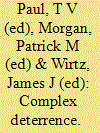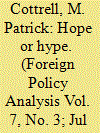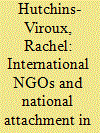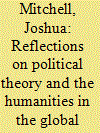| Srl | Item |
| 1 |
ID:
107101


|
|
|
|
|
| Publication |
New Delhi, Cambridge University Press, 2011.
|
| Description |
x, 345p.
|
| Standard Number |
9788175967816, hbk
|
|
|
|
|
|
|
|
|
|
|
|
Copies: C:1/I:0,R:0,Q:0
Circulation
| Accession# | Call# | Current Location | Status | Policy | Location |
| 056218 | 327.73/PAU 056218 | Main | On Shelf | General | |
|
|
|
|
| 2 |
ID:
106274


|
|
|
|
|
| Publication |
2011.
|
| Summary/Abstract |
Many foreign affairs cognoscenti agree that the United States needs to restore its standing as a legitimate world leader and recommit to international institutions in order to address the world's most pressing problems. However, these prescriptions mean relatively little without first examining what legitimate leadership entails and whether such leadership is, in fact, possible. This article proceeds in three steps. First, it discusses the meaning of legitimate leadership in the context of international institutions and underscores the enduring challenges the United States faces in this regard. Second, it highlights the domestic political impediments that ineluctably constrain the implementation of a consistent and cohesive US foreign policy. Finally, the article suggests that if the US legitimacy deficit is to some degree a fact of life, we should rethink which governance arrangements are most capable of harnessing US power for a greater good and devote increased attention to what legal scholars call "new governance."
|
|
|
|
|
|
|
|
|
|
|
|
|
|
|
|
| 3 |
ID:
096837


|
|
|
|
|
| Publication |
2010.
|
| Summary/Abstract |
This article evaluates the evolution of Americans' sense of solidarity, community, and identity in the age of globalisation through an examination of their involvement with non-governmental organisations (NGOs) and social movements active in the developing world. This analysis draws on Jürgen Habermas' contention that, in this age of an increasingly global and inequitable economy, civil society organisations that extend beyond national borders are more likely than other institutions to engender transnational solidarity. The article focuses primarily on results of an opinion survey conducted by the author, examining to what extent U.S. volunteers for international NGOs exhibit national or transnational senses of belonging. Conclusions include the ideas that this cosmopolitan population may indicate an emerging trend in greater feelings of solidarity with and attachment to developing countries, leading to increased support for more multilateral decision-making. However, this more global consciousness seems unlikely to replace feelings of national attachment and belonging.
|
|
|
|
|
|
|
|
|
|
|
|
|
|
|
|
| 4 |
ID:
150522


|
|
|
|
|
| Summary/Abstract |
Has the uneasy marriage between political theory and political science reached the point where a divorce is now necessary? I consider here the gradual decline of political theory after its post-World War II heyday and its growing self-enclosure in the face of global events that call out for the deeper sort of inquiry that political theory can offer. Drawing on examples from both the Middle East and America, I turn next to a number of institutional considerations that help us understand why this has happened. These institutional challenges pale, however, next to the challenge the hermeneutics of suspicion poses in the twenty-first century to a world increasingly exhausted by the liberal and anti-modern tropes, and in need of constructive understandings of how to go forward. I conclude with the suggestion that political theory and the humanities are better situated within a domain called comparative canonical inquiry.
|
|
|
|
|
|
|
|
|
|
|
|
|
|
|
|